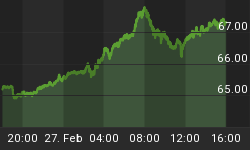Why Read: Because whether we are going to be faced with inflation or deflation in the developed countries, and the world economy generally is a critical question - and one that affects not just investors, but everyone.
Featured Article: In a recently published article Michael Pento (Pento Portfolio Strategies), said to be an Austrian School of Economics specialist, says (among other things):
- deflation is "the free-market approach to rectify a secular period of superfluous money supply growth, debt accumulation and asset price appreciation";
- once Central Banks stop expanding the money supply, deflation takes hold;
- both the U.S. Federal Reserve and The European Central Bank have "proclaimed that they are on hold from debt monetization and currency debasement, the same monetary environment that led to the pronounced deflation that occurred during fall of 2008 has arrived once again"; and,
- a "healthy and cathartic period of deflation is needed; where asset prices fall, money supply shrinks and debt levels are reduced to a level that can be supported by the free market. This is the only viable answer for various nations struggling with solvency".
Commentary: Mr. Pento concludes his article by saying that:
- it is "vitally important" for investors to determine for how long Central Banks - which he sees as currently allowing deflation to prevail - will continue on that deflationary path before those Central Banks adopt historic policies and revert to inflation as economic conditions deteriorate further; and,
- it is important for investors to understand at any point in time where Central Banks policies are in "the cycle of inflation and deflation" and then to invest accordingly".
Mr. Pento has to be right in a number of the things he says. In particular that:
- the U.S. Federal Reserve and the European Central Bank both currently are voicing policies of austerity over policies of quantitative easing, which in theory ought to be directionally deflationary; and,
- whether over time the now extensively globalized world economy will face inflation due to Central Bank policies or other factors (such as agricultural production, climate change issues, environmental issues, fresh water issues, etc.), or will face a period of deflation has to be important to financial market investors.
That said:
- the importance of whether we face inflation or deflation going forward will impact not only investors, but beyond that developed and developing country populations from the perspective of job creation, standard of living, etc..;
- while history may be useful to review how Central Banks have behaved in the past, that may not prove to be a good predictor of how Central Banks behave going forward for at least the following reasons:
- in recent times the world has operated in a completely 'fiat currency' environment only after 1971 - a period of just over 40 years,
- economic globalization has largely developed in the past 20 years, and has brought with it unprecedented (in modern day terms) country specific interdependencies,
- the sovereign debt of the developed countries is at unprecedented levels and growing,
- the banking systems in many of the developed countries have taken on a 'life of their own' - the concept of 'too big to fail' adds a dimension that is extremely difficult for developed country governments and Central Banks to deal with - if as a practical matter they prove in the end able to do that; and,
- there is growing wealth disparity in the developed countries that can be argued to be unhealthy, and ever more 'potentially problematic'.
One might think of the world as an 'economic 190 egg 'scrambled egg mixture' that continues to be beaten, and hence is a work in progress until it is put in a pan and cooked. In the end, the 'proof of the omelet is in the eating'. From 20,000 feet, it seems reasonable to think that:
- continued 'robbing Peter to pay Paul' has to lead to prolonged inflation so long as that process continues; and,
- in the end there has to be some sort of 'resetting of the Monopoly Board', and that likely have to be done through a 'deflationary period' process.
Mr. Pento does not venture a specific opinion as to whether in the longer term world inflation or deflation is likely to occur. That is sensible on his part, given the seemingly limitless number of permutations and combinations of things that might happen in our ever more complex economic world going forward. His views are very relevant to short term changes that can be observed and acted on in an investment/trading environment.
You ought to read Mr. Pento's article, this commentary, and everything else you can get your hands on - then reach your own conclusion(s) with respect to the likelihood of an inflationary or deflationary environment as things unfold.
Answer to the Most Important Question Facing Investors Today
Source: King World News, Michael Pento, May 20, 2012
Reading time: 4 minutes















